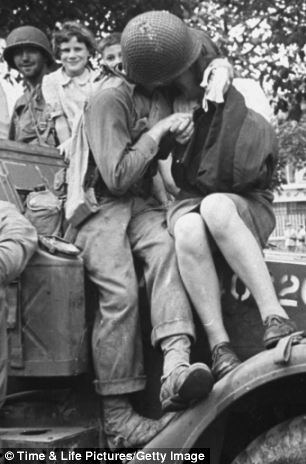Sixty-nine years ago today, the Allies invaded the beaches of Normandy, France. From the moment they secured a beachhead and through the decades, the paratroopers, soldiers, sailors, and airmen that made up that armada have been heroes to millions. Many of us knew these men only as old men, not the young men they had been when they fought and suffered to free Europe from the tyranny of Nazism. When I was a kid, these guys seemed superhuman to me, despite their age. I had read how they had helped beat the villains Hitler, Tojo, and Mussolini, helping to save the world, just like Superman or Batman did in the comic books I also read. From our standpoint decades later, it all seems that the war was preordained because we all want to believe that good will always defeat evil, no matter the form it takes. That’s what the comic books and the movies I was enthralled with taught me. That’s just the way life is supposed to be. It’s a childlike belief in many ways, but the good guys did win World War II.
Thus, it becomes supremely maddening to some of us when someone comes along and points out the faults of our heroes. University of Wisconsin-Madison History professor Mary Louise Roberts will appear to want to do just that in her book, What Soldiers Do: Sex and the American GI in World War II France. Roberts came across some documents in Le Havre, France, that had been sealed for nearly 70 years. The letters were between the mayor of Le Havre and the American commander in the region, a Colonel Weed. In the letters, the mayor pleads to the colonel to control his men. Also included were police reports and citizen complaints of GI behavior. Public sex, prostitution, thievery, harrassment, and rape were some of the charges against American soldiers in Normandy.
In the interest of fairness, I haven’t read Dr. Roberts’ book yet, and will hold off on judgement of it. It may prove to be a very well-researched and written book, and I honestly believe an important one, even if others may disagree with its slant or content. It at least gets the audience asking questions and talking about the subject matter, which can lead to a better understanding of warfare and human behavior. Works like this tend to get many people riled up. The hero worshippers and the true believers don’t want to hear about the terrible things that often happen in war, especially crimes committed by your own side. Veterans of any war already know such things occur on both sides, but rarely speak of them due to guilt or just wanting to forget. I’m sure Professor Roberts has already had her credentials, motives, and political leanings questioned for writing a book that explores crimes committed by American soldiers while in France. Pointing out the flaws in our heroes goes against the “Greatest Generation” moniker, which I personally do not like. You will have bad eggs in every time period, and every generation of Americans has trials and tribulations we must respond too. It is how that generation responds that matters. Besides, how many histories of the rah-rah variety do we really need? Isn’t there room in the literature of the war for a book that may make us all a little uncomfortable? I believe there is, because I don’t think you can really ever diminish what the American, Free French, British, Polish, and Canadian soldiers did in Normandy, nor throughout the war. We don’t seem to question our other ally, the Russians, all that much, and many could argue strongly that Stalin was even worse than Hitler.
But many might say-hey, wait a minute, these were American boys-how could our heroes have done such things?! For the majority of us, especially those of us that had a father, grandfather, uncle, brother, or friend fight in Normandy, it is difficult to watch our heroes get torn down, becoming something much worse and far more mortal-human.
To read more about Professor Roberts’ book, click on the link below:
What Soldiers Do: Sex and the American GI in World War II France

